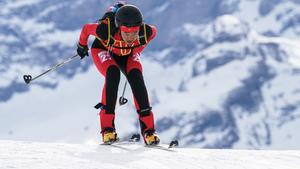Tibetan teen excels at Lausanne 2020 to take sport of ski mountaineering by storm
 Suolang Chodron produced two commendable fourth-place finishes for China in ski mountaineering at the Winter Youth Olympics. (PHOTO / XINHUA)
Suolang Chodron produced two commendable fourth-place finishes for China in ski mountaineering at the Winter Youth Olympics. (PHOTO / XINHUA)
Snow-capped mountains, blue skies and clear water — as Suolang Chodron surveys the scenery, she feels like she could be at home. But rather than chasing sheep on the Tibetan Plateau, former shepherd girl Suo-lang has been chasing Olympic glory in the Swiss Alps, on the shores of Lake Geneva.
The 17-year-old came desperately close to realizing her podium dream in ski mountaineering at the Lausanne 2020 Winter Youth Games, but just missed out on bronze medals in both the individual and sprint races on Jan 10 and 13.
Considering she first stepped onto a pair of skis just three years ago, her fourth-place finishes were something of a minor miracle. “I love ski mountaineering. It’s special, I think, to climb and climb and climb,” said Suolang.
Years of herding sheep in Xainza county, Nagpu, as a youngster have conditioned Sualong for this unforgiving sport, which is usually dominated by Europeans and North Americans.
In fourth grade, she was selected to attend Nagpu’s sports school due to her long-distance running ability, with her parents relieving her of herding duties.
Suolang also harbored hoop dreams, and she later earned a call-up to the Tibetan Sports School’s basketball team. “Basketball has always been my favorite,” she said.
Despite her lack of skiing experience, Suolang’s outstanding athleticism led her to be picked for the Tibet Ski Mountaineering Team in 2017.
Coach Ngawang Tashi was awestruck by her work ethic. “She didn’t rest even when she was sick. If I asked her to stop, she’d cry,” said Tashi. “At night she’d practice transitions in the climbing section, switching from carrying the skis to wearing them, or vice versa.”
The China Mountaineering Association soon came calling and picked Suolang for the Lausanne Games.
The national team training was another level of intensity, but even that did not faze Suolang. “In every drill I kept reminding myself of what the coach said. If I couldn’t do it this time, I’d try again. If I couldn’t do it that day, I’d go to sleep and pick up where I left off the next day.”
It is not simply sheer determination, however, that makes Suolang so suited to ski mountaineering, according to Jin Yubo, coach of the Chinese youth team.
“You can tell how much she loves the sport. Ski mountaineering requires athletes to be detail-oriented, and she’s doing well at almost every detail. That’s what has taken her this far,” said Jin.
Being far from home, however, takes an emotional toll on Suolang, who carries Tibetan trinkets with her wherever she trains or competes. On the journey to Lausanne, she brought a khata (traditional scarf) and a whip from her shepherding days as good-luck emblems.
“If I’m missing home badly, I can’t really go home,” she said. “Then I think I’d better get good results. I don’t want to let my parents down.”
In Lausanne, Suolang’s rival competitors were mostly from traditional ski powerhouses like Norway, France and Switzerland. Most started skiing at age 3 or 4 and took up ski mountaineering from age 12 or so.
After crossing the finish line in the sprint, Suolang appeared overcome with emotion as she knelt down and insisted: “I’m not crying. I just couldn’t help it when my coach came to me.”
Despite her disappointment at missing out on the top three, Suolang had plenty to be proud of.
Wang Yongfeng, vice-president of the China Mountaineering Association, said her results were inconceivable three years ago. Back then, simply making it to the finish line was an achievement for the Chinese contingent.
Because of her deficiencies in the downhill section, Suolang puts extra effort into climbing, with her lightning-quick ascents getting her noticed in the Alps. “That’s the very fast Chinese girl!” people said as she bounded up the slope.
Ski mountaineering is not an official Olympic sport yet, but that is expected to change following its debut at the Youth Games — possibly as early as the 2026 Winter Olympics in Italy, when Suolang and her teammates will be in their prime.
“It’s thrilling to watch such a fierce competition. Also, ski mountaineering could be adopted as a practical skill in some Chinese regions that have heavy snowfall, like it is in Europe,” said Jin, who is optimistic about the sport’s chances of being included in the Winter Olympics.
Suolang has not thought that far ahead. Apart from honing her mountaineering skills, she also has her sights set on going to university.
“My brother’s in university now. We have a video call every night except for competition days. I often read a book word by word to him,” she said.
In years to come, Suolang might well be video-chatting with her sibling with an Olympic medal hanging around her neck.


